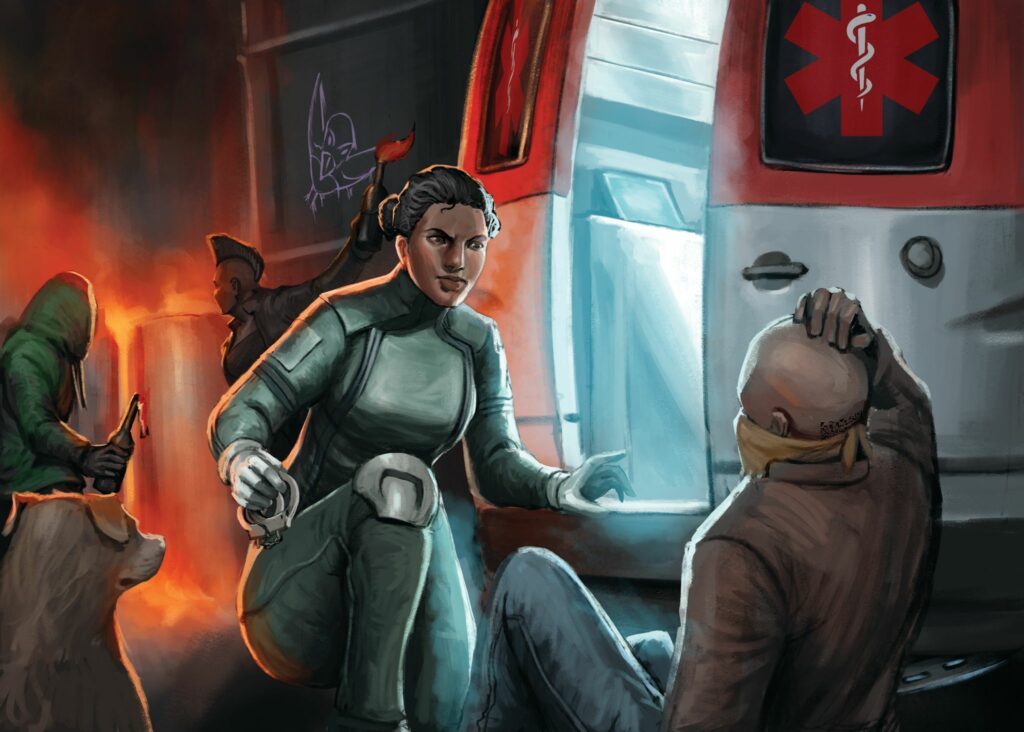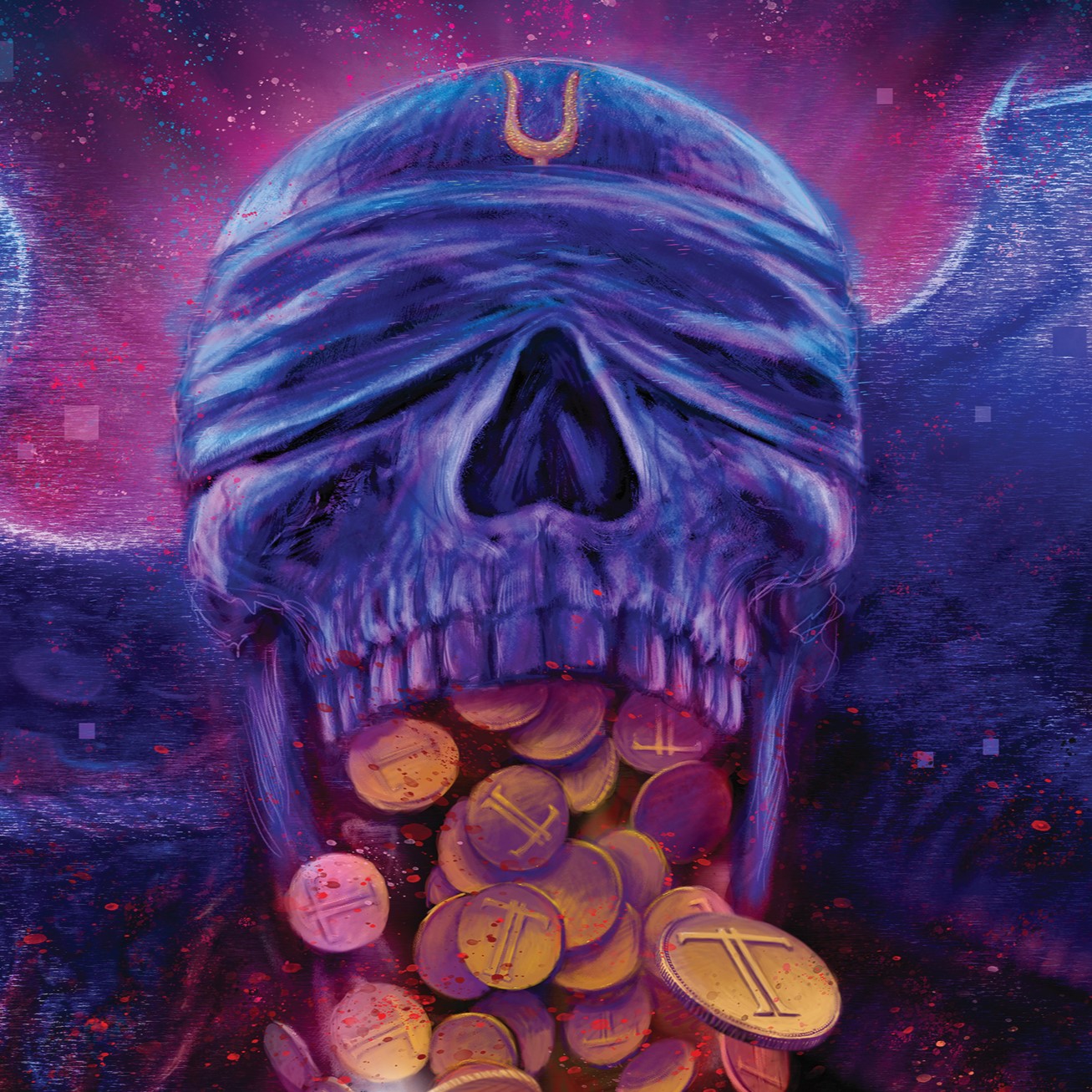Content warning: This story contains depictions of kidnapping, dehumanization, medical horror, and implied violence.
Charlotte had an eye for talent. She’d picked Adrian Seis out of his dead-end clone cohort, honed his natural aptitude to a knife’s edge. Charlotte, after all, was a hunter, and recruitment was only hunting by another name.
Now, as the ambulance hopper hovered over Rio, she watched Adrian watch the crowd. She felt the fuzz at the back of her brainstem, the psychic knack that told her he was stretching his vision out, out, mapping the mental topography of the streets below. All she could see when she looked down was a pulsing blur, utterly filling the space between blocks, pushing back blockades and circling the government buildings. Looks like a slime mold, to me.
Adrian, though, could pick out details. A useful skill when scanning some two million rioters and not a small number of BrazMil soldiers, chaperoning. Those soldiers were staring daggers, assault rifles, EMP grenades, and exosuit-mounted cannons at the police and gov-funded mercs.
Military support had emboldened the crowd. Made them confident. Confident people are easy targets, she’d told Adrian. Lesson number whatever. They make mistakes and don’t even notice. And so people were flooding the streets, waving finger painted signs, singing little chants about courageously being themselves. And clones, of course. People and clones, confidently announcing themselves.
“Mm,” said Adrian, banking the hopper before he’d even opened his eyes. “Think it’s a Peggy. Elements of panic. Not moving much.”
The Peggys—one of a few dozen agriculturally-minded clonelines. Prone to fancies of freedom. Abruptly retired.
The ambulance gently lowered by an alley, the crowd clearing a space. Charlotte smirked at her own ingenuity for the sixth time that day. Warfare and riots: let the medics through, that’s the rule. Today was yet another valuable lesson for Adrian. Mimicry was one of the most powerful tools in a predator’s belt.
Checking the cam, Charlotte saw two women, one lying on her back, the other crouched over her. Which one… there. The barcode.
“Stay here ready to lift. This’ll be the last for this trip.”
Adrian nodded, brows furrowing.
The collective rage of the riot was already detectable, even to her subtle psychic senses, but when she opened the back of the ambulance, the wall of noise made by millions of aligned voices nearly swept her back inside. She appreciated all the more the bubble of relative peace the hopper’s borrowed iconography bought her.
She pulled a float pallet behind her. “What’s the situation?”
The crouching woman looked at her with relief. “She was shoved, or something. She hit her head but there’s no blood. She’s not making any sense, though.”
Charlotte pulled the float pallet alongside the pair. The Peggy was still speaking—“I think her arm’s messed up, too, shoulder might have been pulled out of her—”—when Charlotte pressed the hypospray to her neck.
“Hey! I’m not the…” The clone’s eyes widened. The easier to see your pupils dilate, my dear. “Oh, God, God! Don’t do this! Don’t take me back there!”
“Not to worry. There’s no there to go back to. Whole facility’s a crater, last I heard.”
The clone was getting quiet, fighting unconsciousness. Beside her, the friend was mumbling incoherently, insistently, “jnt… hnt… juh-key…!”
The clone pleaded. “Thish… it’sh a war crime. You can’t…”
The crowd’s emotional miasma was setting off some kind of mental alarm. Still a lot of anger, yeah, but the direction was shifting. People pushed closer. Chants became shouts. Charlotte tuned them out best she could as she angled the float pallet to scoop up her catch.
She leaned in close, let her smirk color her voice. “Oh? You’re at war, are you? Funny. I’m at work.”
But then panic was pushing through her. The crowd’s? Her own? Can’t be a bomb, I’d have heard it. Another assassination?
And then she was yanked back by the shoulder. She wheeled to confront whoever’d grabbed her, slipping back into her role. “I’m a medic! I’m trying to help!”
But the crowd had closed in. All that anger was now focused Charlotte-ward. Hands were grasping. They know. How the hell do they know? A placard was raised like an executioner’s ax.
Charlotte spun and launched herself at the ambulance. Fingers grasped weakly at her cuffs; it was enough to make her stumble, fall. She turned to see who’d done her in: it was the mumbling friend, with a busted arm. And a perfectly good arm, too, apparently. Should have knocked them both out. The mumbles finally coalesced: “Jinteki. Hunter.”
They had her.
“Portia!” she yelled. Portia labiata—jumping spider. Get the hell out of here, Adrian.
And so he did. As the vehicle pirouetted, moshing the mob, Charlotte saw it: a drippy circle sprouting eight bent legs, spray painted in black on the side of her ambulance, over the caduceus.
And it was more than just some crude spider, she knew. It was an icon. Danger. Stay away. Or maybe kill it fast.
They must have been constrained, whoever’d tagged her ambulance. Someone figured out what was going on and had the tools ready at hand. They’d had seconds to act, and created this perfect thing without being spotted. Amazing what an artist can do with no time at all and a can of spray paint.
Art under pressure. Ha.
Adrian was away. Charlotte was dragged, dragged. Eventually she was somewhere new, dark. So this is what it feels like. But mostly she kept her mind on the spider, and the artist behind it.
You’ve got a gift, kid.


